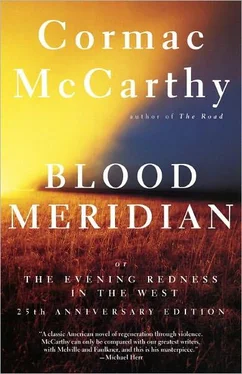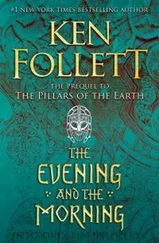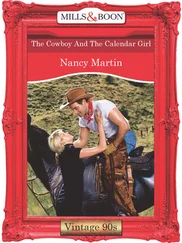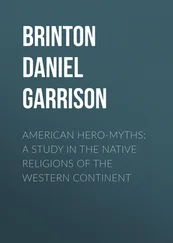That night they sat at the fire like ghosts in their dusty beards and clothing, rapt, pyrolatrous. The fires died and small coals scampered down the plain and sand crept past in the dark all night like armies of lice on the move. In the night some of the horses began to scream and daybreak found several so crazed with snowblindness they required to be shot. When they rode out the Mexican they called McGill was on his third horse in as many days. He could not have blacked the eyes of the pony he’d ridden coming up from the dry lake short of muzzling it like a dog and the horse he now rode was wilder yet and there were only three animals left in the caballado.
That afternoon the two Delawares that had left them a day out of Janos caught them up where they nooned at a mineral well. They had with them the veteran’s horse, still saddled. Glanton walked out to where the animal stood and took up the trailing reins and led it to the fire where he removed the rifle from the scabbard and handed it to David Brown and then began to go through the wallet strapped to the cantle and to pitch the veteran’s meagre effects into the fire. He undid the girthstraps and loosed the other accoutrements and piled them onto the flames, blankets, saddle, all, the greasy wool and leather sending up a foul gray smoke.
Then they rode on. They were moving north and for two days the Delawares read the smokes on the distant peaks and then the smokes stopped and there were no more. As they entered the foothills they came upon a dusty old diligence with six horses in the traces grazing the dry grass in a fold among the barren scrag.
A deputation cut for the carriage and the horses jerked their heads and shied and went trotting. The riders harried them about the basin until they were circling like paper horses in a windtrap and the diligence rattling after with one broken wheel. The black walked out waving his hat and called them off and he approached the yoked horses with the hat outheld and talked to them where they stood trembling until he could reach the trailing straps.
Glanton walked past him and opened the carriage door. The inside of the coach was splintered up with new wood and a dead man slumped out and hung head down. There was another man inside and a young boy and they lay enhearsed with their weapons in a stink to drive a buzzard off a gutcart. Glanton took the guns and ammunition and handed them out. Two men climbed to the freightdeck and cut away the ropes and the tattered tarp and they kicked down a steamer trunk and an old rawhide dispatch box and broke them open. Glanton cut the straps on the dispatch box with his knife and tipped the box out in the sand. Letters penned for any destination save here began to skitter and drift away down the canyon. There were a few tagged bags of ore samples in the box and he emptied them on the ground and kicked at the lumps of ore and looked about. He looked inside the coach again and then he spat and turned and looked the horses over. They were big American horses but badly used up. He directed two of them cut out of the traces and then he waved the black away from the lead horse and wafted his hat at the animals. They set off down the floor of the canyon, mismatched and sawing in the harness, the diligence swaying on its leather springs and the dead man dangling out of the clapping door. They diminished upon the plain to the west first the sound and then the shape of them dissolving in the heat rising off the sand until they were no more than a mote struggling in that hallucinatory void and then nothing at all. The riders rode on.
All afternoon they rode singlefile up thorugh the mountains. A small gray lanneret flew about them as if seeking their banner and then it shied away over the plain below on its slender falcon wings. They rode on through sandstone cities in the dusk of that day, past castle and keep and windfashioned watchtower and stone granaries in sun and in shadow. They rode through marl and terracotta and rifts of copper shale and they rode through a wooded swag and out upon a promontory overlooking a bleak and barren caldera where lay the abandoned ruins of Santa Rita del Cobre.
Here they made a dry and fireless camp. They sent down scouts and Glanton walked out on the bluff and sat in the dusk watching the darkness deepen in the gulf below to see if any light should show itself down there. The scouting party returned in the dark and it was still dark in the morning when the company mounted and rode out.
They entered the caldera in a condition of half gray dawn, riding singlefile through the shaley streets between rows of old adobes abandoned these dozen years past when the Apaches cut off the wagontrains from Chihuahua and laid the works under siege. The starving Mexicans had set out afoot on the long journey south but none ever arrived. The Americans rode past the slag and rubble and the dark shapes of shaft mouths and they rode past the smeltinghouse where piles of ore stood about and weathered wagons and orecarts bonewhite in the dawn and the dark iron shapes of abandoned machinery. They crossed a stony arroyo and rode on through that gutted terrain to a slight rise where sat the old presidio, a large triangular building of adobe with round towers at the corners. There was a single door in the east wall and as they approached they could see rising the smoke that they had smelled on the morning air.
Glanton pounded on the door with his rawhidecovered club like a traveler at an inn. A bluish light suffused the hills about and the tallest peaks to the north stood in the only sun while all the caldera lay in darkness yet. The echo of his knocking clapped about the stark and riven walls of rock and returned. The men sat their horses. Glanton gave the door a kick.
Come out if you’re white, he called.
Who’s there? called a voice.
Glanton spat
Who is it? they called.
Open it, said Glanton.
They waited. Chains were drawn rattling across the wood. The tall door creaked inward and a man stood before them at the ready with a rifle. Glanton touched his horse with his knee and it raised its head along the door and forced it open and they rode through.
In the gray murk within the compound they dismounted and tied. A few old freightwagons stood about, some looted of their wheels by travelers. There was a lamp burning in one of the offices and several men stood in the door. Glanton crossed the triangle. The men stepped aside. We thought you was injins they said.
They were four left out of a party of seven that had set out for the mountains to prospect for precious metals. They had been barricaded in the old presidio for three days, fled here from the desert to the south pursued by the savages. One of the men was shot through the lower chest and he lay propped against the wall in the office. Irving came in and looked at him.
What have you done for him? he said.
Aint done nothin.
What do you want me to do for him?
Aint asked you to do nothin.
That’s good, said Irving. Because there aint nothing to be done.
He looked at them. They were foul and ragged and half crazed. They’d been making forays at night up the arroyo for wood and water and they had been feeding off a dead mule that lay gutted and stinking in the far corner of the yard. The first thing they asked for was whiskey and the next was tobacco. They had but two animals and one of these had been snakebit in the desert and this thing now stood in the compound with its head enormously swollen and grotesque like some fabled equine ideation out of an Attic tragedy. It had been bitten on the nose and its eyes bulged out of the shapeless head in a horror of agony and it tottered moaning toward the clustered horses of the company with its long misshapen muzzle swinging and drooling and its breath wheezing in the throttled pipes of its throat. The skin had split open along the bridge of its nose and the bone shone through pinkish white and its small ears looked like paper spills twisted into either side of a hairy loaf of dough. The American horses began to mill and separate along the wall at its approach and it swung after them blindly. There was a flurry of thumps and kicks and the horses began to circle the compound. A small mottled stallion belonging to one of the Delawares came out of the remuda and struck at the thing twice and then turned and buried its teeth in its neck. Out of the mad horse’s throat came a sound that brought the men to the door.
Читать дальше












